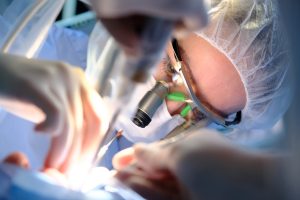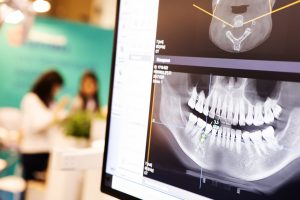Resource Library
Start Reading

Any cancer diagnosis is a frightening prospect. But learning that you have oral cancer can be especially alarming because it often requires removing some or all of your jawbone .
Thankfully, major advances in maxillofacial surgery and prosthodontics have made it possible to reconstruct the jaw after it’s been removed for cancer treatment or any other reason. Surgical removal of the jaw is a radical surgery that can affect everything from your appearance to your ability to eat, speak, swallow, and more. That’s why skilled prosthodontists at Penn Dental Family Practice are prepared to provide exceptional jaw reconstruction for oral cancer patients.
Treatment for oral cancer may require removing some or all of the jaw bone.
 When tumors are removed in a procedure called a tumor resection, the entire tumor and the surrounding healthy tissue are surgically removed, reducing the likelihood of the cancer returning. Sometimes, large tumors that extend into the throat need to be removed via a mandibulotomy. For this, the surgeon makes an incision in the neck and may need to cut through the jaw bone to access the tumor.
When tumors are removed in a procedure called a tumor resection, the entire tumor and the surrounding healthy tissue are surgically removed, reducing the likelihood of the cancer returning. Sometimes, large tumors that extend into the throat need to be removed via a mandibulotomy. For this, the surgeon makes an incision in the neck and may need to cut through the jaw bone to access the tumor.
When the tumor has grown into or around the jawbone, some or all of the jawbone also needs to be removed with a mandibulectomy. When a large portion of the jaw is removed, it can be replaced with bone from another part of the body, such as the hip or lower leg. Sometimes, a metal plate or donor bones are used to replace the jaw. This reconstruction may take place during the same procedure as the tumor removal, or at a later time.
Not all oral cancer patients require surgery to remove tumors from their jaws. Some cases can be treated using radiation therapy or chemotherapy, but this still requires the involvement of a prosthodontist. Many cancer treatments can weaken the bones, or cause other dental concerns. This can lead to the need for prosthetics like dental implants, dental bridges, or even full sets of dentures.
 When you need jaw reconstruction after oral cancer surgery, your healthcare team will discuss the plan with you beforehand. Although some reconstruction is performed by the surgeon who removes the cancer, a different surgeon or group of surgeons will likely provide the prosthetics.
When you need jaw reconstruction after oral cancer surgery, your healthcare team will discuss the plan with you beforehand. Although some reconstruction is performed by the surgeon who removes the cancer, a different surgeon or group of surgeons will likely provide the prosthetics.
Prosthodontists perform most jaw reconstruction for oral cancer patients. These dental specialists undergo an additional 2–3 years of training beyond dental school, and work with patients who require prosthetics for facial or dental reconstruction after illness or injury. Prosthodontists restore both the form and function of the jaw using bone grafts, dentures, and dental implants.
Because it can take time to recover and heal, prosthodontists may provide temporary prosthetics for you to use during treatment. Prosthodontists also provide ongoing care after jaw reconstruction for oral cancer patients. Prosthetics often need adjustments and evaluations, and in some cases, replacement after several years.
 Jaw surgery and reconstruction is a major surgery that impacts nearly every aspect of a patient’s life. Everything from their appearance to their ability to speak, eat, swallow, breathe, and more is affected. Functional rehabilitation is key to recovery, as successful rehabilitation can restore some or all oral functions, ensuring good quality of life. This rehabilitation can take up to a year or longer, depending on the extent of the reconstruction.
Jaw surgery and reconstruction is a major surgery that impacts nearly every aspect of a patient’s life. Everything from their appearance to their ability to speak, eat, swallow, breathe, and more is affected. Functional rehabilitation is key to recovery, as successful rehabilitation can restore some or all oral functions, ensuring good quality of life. This rehabilitation can take up to a year or longer, depending on the extent of the reconstruction.
However, adding a prosthodontist to your care team as soon as you are diagnosed makes it possible to improve your overall prognosis. They can identify different treatment options using tools like 3D imaging technology before surgery and begin planning rehabilitation.
PDFP prosthodontists are committed to helping cancer patients through every step of their treatment. Our team of prosthodontists is among the most experienced in the Philadelphia area and renowned for providing high-quality, patient-centered care. By making us part of your oral cancer treatment team, you can expect a personalized treatment plan developed by compassionate, experienced providers with your goals and well-being as the primary focus.
To learn more about prosthodontics and oral cancer treatment, we encourage you to make an appointment today. Schedule a visit now or call us any time at (215) 898-PDFP.